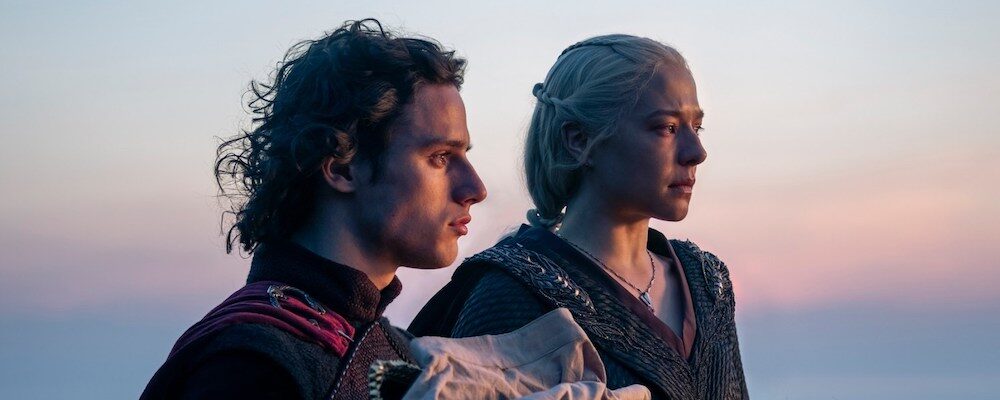‘House of the Dragon’ Season 2 Raises the Stakes in Its Riveting War for the Throne
Alci Rengifo
It has been almost two years since “House of the Dragon” successfully premiered as the first spinoff of HBO’s massively influential “Game of Thrones.” Based on another novel by creator George R.R. Martin, this prequel turned out to be a satisfying addition, one that avoided copying the original too much while telling its own grand fantasy saga of a royal civil war. The second season now proves it can sustain the momentum. Whether it can ever match its now classic predecessor is almost an unfair question considering how well produced “House” stands on its own. With conflict now well underway, the focus is on expanding on the already established players, with at times archaic but always engaging style.
The war between rival Targaryens continues after last season ended with Queen Rhaenyra Targaryen (Emma D’Arcy) and Daemon (Matt Smith) of Dragonstone enduring the death of their son, Lucerys (Elliot Grihault). Everyone knows revenge will be extracted from their enemies at King’s Landing, led by Queen Alicent Hightower (Olivia Cooke) and her sons, unsure King Aegon (Tom Glynn-Carney) and the cunning Prince Aemond (Ewan Mitchell). A bigger war looms as Daemon strikes the first blow by sending hired hands to carry out a retaliatory killing. Power plays in King’s Landing change the tone when Ser Criston Cole (Fabien Frankel) and Aegon make a surprising, hasty move against Ser Otto Hightower (Rhys Ifans), Alicent’s father. Aegon strips Otto of his title as Hand of the King and hands it over to Ser Criston. The stage is set for a large clash involving battlefields and the fiery power of the family dragons.
“House of the Dragon” famously kept shooting through last year’s writer’s strike, which may account for why some of the narrative doesn’t feel as tight as the first season. Still, showrunner Ryan Condal maintains the franchise’s impressive quality. As in the book the show is based on, “Fire & Blood,” and the wider “Game of Thrones” series, the dragons and fantasy are still decorations for a classic medieval story of dueling ambitions. This series in particular enjoys playing with the viewers’ potential inclinations. In every episode, it’s hard to choose exactly who to root for. Aegon may be a naïve fool, but he doesn’t have the cold bloodedness of Aemond, a born warlord. We sympathize with Rhaenyra’s sorrow at losing a son yet Daemon’s response is just as cruel on Aegon’s wife, Queen Helaena (Phia Saban). This is a fantasy series, but it does have a strong resonance when we’re watching war on the news and children needlessly dying.
For now, this still remains a more enclosed series than “Game of Thrones,” set mostly within the halls of the Targaryens’ warring castles. A few journeys into the outside involve moments of medieval debauchery, like the hard-drinking Aegon visiting a brothel where he stupidly mocks Aemond. There are not any of the extended journeys or even wonderful details such as folk songs that were spread all over its predecessor. The intrigues and psychological games make up for these, thanks in large part to the stellar cast. Daemon, so cocky and thirsty for power last season, becomes much more conflicted with strange visions hinting at his deep fears after he takes Harrenhal. Aegon starts off as a total buffoon but gathers empathy when holding court, promising a farmer he will replenish his stock and the Hand needing to lean over and explain it’s not so easy. The most significant character shift involves Ser Criston, member of a guard meant to practice chastity who is Alicent’s lover. As he gains more power, his own inner reckless warlord starts peering out. Seen as commoner stock by the Targaryens, Ser Criston is that classic character who threatens to outshine them with a ferocity no one suspected was there. Episode four highlights him in a fiery battle that delivers a great cliffhanger.
When “House of the Dragon” first premiered in 2022, much attention was given to the prominence of female characters. A challenge already facing this show is that the cast is so large, some good characters get lost in all the ongoing developments. Rhaenyra should be the key focus but she disappears for large swathes of time, though when she is given a moment it tends to be memorable. Alicent also threatens to be pushed aside by all the maneuvering being done by the men running King’s Landing. Of course, that’s also part of this story’s theme about a world where women are forced to live under a patriarchal system. Daemon doesn’t even bother to confer with Rhaenyra when he hatches a plan to avenge Lucerys. Aemond clearly thinks Alicent is a mere annoyance that will soon be swept away. At Dragonstone, Princess Rhaenys (Eve Best) steals the show in a nice blow to ageism. She’s the real warrior in this clan and gets a dynamic battle scene riding her dragon into combat, with that sort of thrill “Game of Thrones” was so good at. Other characters like Baela (Bethany Antonia) are reduced to near-cameos.
Slight flaws don’t take away the sense of epic storytelling and pathos. Martin’s creation has a classical feel that keeps it perfect for TV. Every chapter ends with enough anticipation left for what’s coming next. Guessing who will win isn’t made easy, because as in real life, the players are not motivated by purely cartoonish drives. Personal desires, slights that need to be forgiven and any other human element, can mean destruction or peace in this tale. The most docile servant can suddenly become a total terror. Like its predecessor, “House of the Dragon” is an addictive watch because it doesn’t depend solely on style. It thrives on pure storytelling.
“House of the Dragon” season two premieres June 16 and airs Sundays at 9 p.m. ET on HBO.

